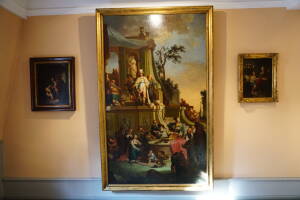Johann Wolfgang Goethe was a prominent figure in German literature, whose work continues to inspire and influence writers to this day. Born in Frankfurt on August 28, 1749, Goethe was the eldest son of Johann Caspar Goethe, a successful lawyer, and Katharina Elisabeth Textor, daughter of the city’s mayor. His parents provided him with an excellent education and encouraged his early interest in literature and the arts.
Goethe’s literary career began with Rococo poems, which he wrote while studying law in Leipzig. These poems, which praised love and wine, were heavily influenced by the literary style of the time. However, it was during his time in Strasbourg that Goethe’s literary career truly took off. In Strasbourg, he met the literary philosopher Johann Gottfried Herder, who drew his attention to the importance of folk poetry and the works of Shakespeare. This encounter would be a turning point in Goethe’s literary development.
In competition with Herder, Goethe wrote his wildly romantic drama Götz von Berlichingen. The play, which stirred up a storm due to its coarse obscenities, made its author one of the leaders of the Sturm und Drang literary movement. This movement, which emerged in the late 1760s and early 1770s, rejected the rules and conventions of the literary establishment and instead celebrated emotion and individualism.
From 1772, Goethe worked at the Wetzlar Imperial Chamber Court. It was here that he met the child-murdering mother who would inspire the character of Margaret in his masterpiece Faust. It was also in Wetzlar that he met Charlotte Buff, whose unrequited love for Goethe inspired her sentimental epistolary novel The Sorrows of Young Werther. The book became a scandalous worldwide success, as a result of which the number of suicides among young people who were hopelessly in love increased.
In 1775, Goethe moved to Weimar, where he became an indispensable minister of the small state. Driven by political ambition, he wanted to develop Weimar into a model state serving bourgeois welfare. It was during this time that he began his passionate love affair with the married Charlotte von Stein, in whom he also found a worthy spiritual partner. In 1786, he traveled to Italy, an experience that would profoundly influence his work. It was during his time in Italy that he wrote his plays Iphigenia in Tauris and Torquato Tasso, as well as the Roman Elegies.
Upon returning home, Goethe entered into a relationship with Christiane Vulpius, with whom he had several children. He no longer took on his previous positions and became the director of the court theater. His great friendship with Friedrich Schiller began in 1794, and the two writers collaborated on a number of works, including ballads and satirical epigrams. With Schiller’s encouragement, Goethe finished his developmental novel, Wilhelm Meister’s Apprentice Years.
Perhaps the greatest couple in world literature, Goethe and Schiller never got together romantically. They called each other Herr Exzellenz and Herr Doctor, and their friendship was a source of mutual inspiration and support. After Schiller’s death in 1805, Goethe’s intellectual loneliness was alleviated by his relationship with the romantic school in Jena, and he drew on the romantics in the choice of themes for his novel Attraction and Choices.
From 1818, Goethe spent his summers in spas in Karlsbad and Marienbad, where he met his last love, the 18-year-old Ulrike von Levetzow. In the last decade of his life, he wrote the Wandering Years of Wilhelm Meister.
Goethe’s influence was not limited to German literature. He was widely regarded as one of the greatest literary figures of his time, with his works influencing countless writers and thinkers for generations to come. In fact, some of his works, such as Faust, have become so iconic that they have entered the public consciousness and are referenced even today.
But Goethe’s contribution to literature was not limited to his creative writing alone. As mentioned earlier, he was also a keen naturalist and scientist, with a deep interest in botany, geology, and other sciences. His contributions to these fields were also significant, and he is remembered as a polymath who was equally at home in the world of literature and science.
One of Goethe’s most significant contributions to science was his work on color theory. In his book, Theory of Colours, he rejected Isaac Newton‘s theory that colors were inherent properties of light and argued instead that they were a result of the interaction between light and the human eye. He proposed that colors were not simply physical properties of light, but rather were a product of our perception of that light. This idea was groundbreaking at the time and paved the way for further research in the field of color theory.
Goethe’s interest in botany also led him to write two important works, The Metamorphosis of Plants and The Botanical Writings. In these works, he explored the idea that plants were not static entities but instead underwent a process of transformation over time. He proposed that each part of a plant was connected to the others, and that the whole plant was constantly changing and evolving. This was a revolutionary idea at the time, and it helped to lay the foundation for the modern field of plant biology.
Goethe’s influence on the world of science did not end with his work on color theory and botany. He also had a keen interest in geology and was one of the first scientists to propose a theory about the origin of mountains. He believed that mountains were formed through a process of gradual uplift and erosion, rather than through sudden catastrophic events such as earthquakes or volcanic eruptions. This idea was also groundbreaking at the time and paved the way for further research into the processes that shape the earth’s surface.
But perhaps the most significant contribution that Goethe made to the world of science was his approach to scientific inquiry. Unlike many of his contemporaries, who saw science as a purely objective pursuit, Goethe believed that the observer’s subjectivity played an important role in scientific observation. He believed that the observer could not be separated from the observed, and that the two were inextricably linked. This idea was revolutionary at the time and helped to lay the foundation for a more holistic approach to scientific inquiry.
Despite his many contributions to literature and science, Goethe was not immune to controversy. His works often stirred up strong emotions, both positive and negative, and he was no stranger to criticism. For example, his novel, The Sorrows of Young Werther, caused a sensation when it was first published, with some critics accusing it of promoting suicide. Goethe himself was deeply affected by the controversy, and he went on to write a second version of the novel in which he toned down some of the more sensational aspects of the story.
Another controversy that surrounded Goethe was his relationship with Charlotte von Stein, which has been the subject of much speculation over the years. Some scholars have argued that the relationship was purely platonic, while others have suggested that there may have been a romantic component to it. Whatever the nature of their relationship, there is no doubt that Charlotte von Stein had a profound influence on Goethe’s life and work, and he remained devoted to her until the end of her life.
Apart from his literary and scientific achievements, Goethe also had a significant impact on philosophy. His views on nature, art, and human existence were widely discussed and debated among philosophers and intellectuals of his time and continue to be studied and discussed today. In this sense, Goethe can be considered a major figure of German idealism, a philosophical movement that emerged in the late 18th and early 19th century and sought to reconcile the ideas of rationalism and romanticism.
One of the central concepts in Goethe’s philosophical thought is the idea of Urphänomen, which can be translated as “original phenomenon” or “archetypal phenomenon”. According to Goethe, the natural world is not just a collection of individual objects and phenomena, but a network of interconnected processes that are governed by universal laws. These laws, however, cannot be discovered through empirical observation alone, but require an intuitive understanding of the underlying patterns and structures of nature.
This idea is closely related to Goethe’s approach to science, which he called “delicate empiricism”. Instead of breaking down nature into its constituent parts and analyzing them in isolation, Goethe believed that one should observe nature as a whole and try to grasp its essence through a process of intuitive perception. This approach is reflected in his famous theory of colors.
In his theory of colors, Goethe rejected the Newtonian view that color is an objective property of light and argued that it is a subjective phenomenon that arises from the interaction of light, the human eye, and the brain. According to Goethe, colors are not fixed entities but are constantly changing depending on the conditions of perception. He also believed that colors have psychological and emotional effects on the human mind and can be used to express complex feelings and ideas in art and literature.
Another important aspect of Goethe’s philosophy is his emphasis on the role of the individual in shaping history and society. Unlike many of his contemporaries who saw history as a deterministic process driven by external forces such as economic and political structures, Goethe believed that individuals have the power to influence and shape their own destiny. He saw this power as arising from the unique combination of rationality and creativity that characterizes human beings.
This view is reflected in Goethe’s literary works, which often depict individuals who are struggling to find their place in the world and to assert their own identity and values against the pressures of society. In his novel “Wilhelm Meister’s Apprenticeship“, for example, the protagonist goes on a journey of self-discovery and tries to find his own way in life, rejecting the conventional paths of career and marriage.
In conclusion, Johann Wolfgang von Goethe was a towering figure of German culture and intellectual life. His contributions to literature, science, and philosophy continue to inspire and challenge us today, and his ideas and insights into the human condition remain as relevant as ever. As Goethe himself once said: “We are never too old to learn something new”.




































































































































